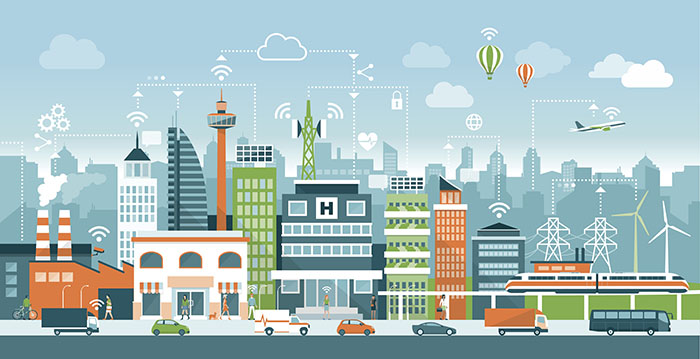Time:2025-07-18 Browse:75

Smart cities are not just a distant concept or a futuristic vision. Many are already actively transforming and expanding rapidly, driven by groundbreaking Internet of Things (IoT) solutions. Municipal governments are utilizing cellular and Low Power Wide Area (LPWAN) wireless technologies to connect and enhance infrastructure, efficiency, convenience, and the overall quality of life for both residents and visitors.
What is a Smart City?
A smart city is a framework primarily built on Information and Communication Technologies (ICT) to develop, implement, and promote sustainable practices that address the challenges of rapid urbanization. A significant part of this ICT framework is a network of intelligent, interconnected devices and machines (a digital city) that transmit data using wireless technology and the cloud. Cloud-based IoT applications receive, analyze, and manage this data in real-time, enabling municipalities, businesses, and citizens to make informed decisions that improve quality of life.
Citizen Interaction with Smart City Ecosystems
Citizens engage with smart city ecosystems through smartphones, mobile devices, and connected vehicles and homes. By integrating devices and data with a city's physical infrastructure and services, costs can be reduced, and sustainability can be enhanced. With the help of IoT, communities can optimize energy distribution, streamline waste collection, reduce traffic congestion, and improve air quality.
Real-World Applications of Smart City Technology
Smart cities exemplify large-scale IoT use cases. For instance:
· Connected Traffic Lights: These systems use data from sensors and vehicles to adjust signal timing in real-time, reducing traffic congestion.
· Smart Vehicles: Connected cars can communicate with parking meters and electric vehicle (EV) charging stations, guiding drivers to the nearest available spot.
· Intelligent Waste Management: Smart garbage bins automatically send data to waste management companies, scheduling pickups based on actual needs rather than fixed schedules.
· Digital Credentials: Citizens can use their smartphones as digital driver's licenses and ID cards, simplifying access to city and government services.
Why Do We Need Smart Cities?
Urbanization is an ongoing and accelerating trend. Today, 54% of the world's population resides in cities, a figure expected to rise to 66% by 2050. This growth will add another 2.5 billion people to urban areas over the next three decades. Achieving environmental, social, and economic sustainability is essential to manage the strain on urban resources.
In September 2015, 193 countries adopted the Sustainable Development Goals (SDGs) at the United Nations. However, centralized decision-making and implementation can be slow, and time is of the essence.
The positive news is that citizens and local authorities are more agile in launching swift initiatives, and smart city technology plays a critical role in achieving these sustainability goals
Copyright ©2025 Guan Ze Technology Co.,Ltd All Rights Reserved. XML